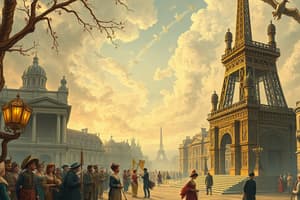Podcast
Questions and Answers
What was a significant outcome of the French Revolution regarding societal structure?
What was a significant outcome of the French Revolution regarding societal structure?
- No changes in society were allowed.
- The aristocracy and church gained more power.
- Individual rights were completely ignored.
- Society began to consider the possibility of change. (correct)
Liberals sought to establish a government with absolute power.
Liberals sought to establish a government with absolute power.
False (B)
Who were two Indian figures that discussed the influence of the French Revolution?
Who were two Indian figures that discussed the influence of the French Revolution?
Raja Rammohan Roy and Derozio
Liberals argued for a ________ parliamentary government.
Liberals argued for a ________ parliamentary government.
Match the following political groups with their beliefs:
Match the following political groups with their beliefs:
What term describes those who wanted to restructure society radically?
What term describes those who wanted to restructure society radically?
The Church of England was favored by European states in the eighteenth century.
The Church of England was favored by European states in the eighteenth century.
What did liberals want to safeguard against governments?
What did liberals want to safeguard against governments?
What did the radicals primarily advocate for in a government system?
What did the radicals primarily advocate for in a government system?
Conservatives were generally in favor of rapid changes during the 18th century.
Conservatives were generally in favor of rapid changes during the 18th century.
Who was Giuseppe Mazzini?
Who was Giuseppe Mazzini?
Radicals opposed the privileges of great __________ and wealthy factory owners.
Radicals opposed the privileges of great __________ and wealthy factory owners.
Match the political groups with their beliefs:
Match the political groups with their beliefs:
What was a common problem faced by populations in rapidly growing towns during industrialization?
What was a common problem faced by populations in rapidly growing towns during industrialization?
Radicals were wholly against private property.
Radicals were wholly against private property.
What did nationalists seek to achieve after the year 1815?
What did nationalists seek to achieve after the year 1815?
Flashcards are hidden until you start studying
Study Notes
Political Ideologies Post-French Revolution
- The French Revolution ignited discussions about freedom and equality in Europe and beyond.
- Pre-eighteenth century society was hierarchically structured with the aristocracy and church holding power.
- Post-revolution, many sought societal transformation, including notable intellectuals like Raja Rammohan Roy and Derozio in India.
- Political responses ranged from gradual reform to radical restructuring, leading to categories like conservatives, liberals, and radicals.
Liberals
- Advocated for religious tolerance in a time when states favored specific religions (e.g., Britain with the Church of England).
- Opposed dynastic rulers' unchecked power, calling for individual rights protection against government.
- Desired a representative parliamentary system with an independent judiciary but did not support universal suffrage.
- Believed voting rights should be limited to men of property and opposed women's suffrage.
Radicals
- Promoted government based on majority rule, contrasting with liberal views.
- Supported women’s suffrage and sought to abolish privileges for wealthy landowners and factory owners.
- Aimed for property ownership equality without entirely rejecting private property.
Conservatives
- Initially resistant to change, conservatives began to recognize the inevitability of some societal transformations post-French Revolution.
- Emphasized slow, respectful change rather than abrupt disparities brought by radical movements.
Nineteenth Century Clashes of Ideologies
- Social and political turmoil spurred by the French Revolution catalyzed clashes between liberals, radicals, and conservatives.
- Attempts at revolutions and reforms revealed both the limitations and possibilities of these political ideologies.
Industrial Society and Social Change
- The period experienced significant social and economic transformations due to industrialization, leading to urban growth and railway expansion.
- Industrialization caused harsh working conditions, long hours, low wages, and common unemployment, particularly in low demand periods.
- Rapid urbanization exacerbated housing and sanitation issues, prompting calls for government changes.
- Revolutionaries in various nations, including France, Italy, Germany, and Russia, sought to overthrow monarchs post-1815.
- Nationalists aimed to form nations where all citizens enjoyed equal rights, exemplified by Giuseppe Mazzini's activism in Italy, which influenced Indian nationalists.
Studying That Suits You
Use AI to generate personalized quizzes and flashcards to suit your learning preferences.




